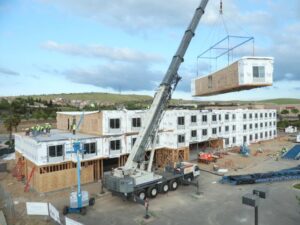
The hospitality industry is no stranger to innovation and change. From the advent of online booking platforms to the rise of eco-friendly and sustainable hotel designs, the sector continually adapts to meet evolving customer demands and industry trends. One such innovation that is gaining traction is the use of prefabricated retail buildings in hotel construction. Prefabrication, often associated with speed and cost-efficiency, offers a compelling alternative to traditional construction methods. In this article, we will delve into the world of prefabricated retail buildings and explore whether they are the future of hotel construction.
Understanding Prefabricated Retail Buildings
To start our exploration, let’s first understand what prefabricated retail buildings are and how they differ from conventional construction methods.
What are Prefabricated Retail Buildings?
Prefabricated retail buildings, also known as modular construction, involve manufacturing various building components off-site in a controlled factory environment. These components, or modules, are then transported to the construction site and assembled to create the final structure. This approach offers several advantages, including reduced construction time, cost savings, and increased sustainability.
Traditional vs. Prefabricated Construction
Comparing traditional and prefabricated construction methods can help us appreciate the differences between the two.
In traditional construction, everything is built on-site, from the foundation to the walls, and the finishing touches. This process is often time-consuming, labor-intensive, and susceptible to weather delays. Prefabrication, on the other hand, streamlines the construction process by pre-manufacturing elements like walls, ceilings, and even entire rooms off-site. This reduces on-site labor requirements and minimizes the impact of weather conditions.
The Benefits of Prefabricated Retail Buildings in Hotel Construction
Now that we understand the basics of prefabrication, let’s explore why it is gaining favor in hotel construction.
Speed of Construction
One of the most significant advantages of prefabricated retail buildings is their speed of construction. Because many components are manufactured simultaneously in a factory, construction projects can progress quickly once the modules arrive on-site. This is particularly appealing in the hotel industry, where time is often of the essence to meet high demand.
Cost Efficiency
Cost is a critical factor in any construction project, and prefabrication offers several cost-saving benefits. Reduced labor costs, shorter construction timelines, and minimal material waste all contribute to lower overall expenses. Additionally, the controlled factory environment allows for better quality control, reducing the need for costly rework.
Sustainability
Sustainability is becoming increasingly important in the hospitality industry, and prefabricated retail buildings align well with eco-friendly initiatives. The controlled manufacturing process generates less waste, and many modular construction materials are recyclable. Furthermore, the reduced on-site construction time can lead to less disruption to the local environment.
Customization and Design Flexibility
Some may assume that prefabrication limits design options, but this is not the case. Modular construction allows for a high degree of customization and design flexibility. Hoteliers can work with architects and modular manufacturers to create unique and attractive spaces that cater to their target clientele.
Consistency and Quality
Consistency and quality are essential in the hotel industry, where guest satisfaction is paramount. Prefabricated retail buildings offer consistent quality because each module is produced in a controlled factory environment with stringent quality control measures. This consistency ensures that guests have a consistent and high-quality experience across all rooms in the hotel.
Case Studies: Successful Implementations
To illustrate the practicality and success of prefabricated retail buildings in hotel construction, let’s explore a few case studies.
Marriott’s AC Hotel in Oklahoma City
Marriott’s AC Hotel in Oklahoma City is a prime example of the benefits of modular construction in the hotel industry. The 142-room hotel was built using prefabricated components, resulting in a significantly faster construction timeline than traditional methods. The hotel features a modern design and high-quality finishes, showcasing the design flexibility and customization options available in modular construction.
CitizenM’s Global Expansion
CitizenM, a Netherlands-based hotel chain, has embraced prefabrication in its global expansion efforts. The company’s modular hotels in various cities, including New York, London, and Paris, demonstrate the scalability and efficiency of modular construction. CitizenM’s ability to quickly assemble hotels in high-demand locations has been a key driver of its success.
Challenges and Considerations
While the benefits of prefabricated retail buildings in hotel construction are evident, there are also challenges and considerations to address.
Initial Investment
Setting up a prefabrication facility and investing in the necessary technology and equipment can be a significant upfront cost. Hotel developers and investors need to carefully evaluate these expenses against the long-term savings and benefits of prefabrication.
Transportation and Site Logistics
Transporting large modular components to the construction site requires careful planning and coordination. Site logistics, including the installation of modules and connecting utilities, also demand efficient management to ensure a smooth construction process.
Design and Planning
Effective collaboration between architects, designers, and modular manufacturers is crucial for successful modular hotel construction. Careful planning and coordination are essential to maximize the advantages of customization while minimizing potential design conflicts.
Local Building Codes and Regulations
Navigating local building codes and regulations can be more complex with prefabricated construction, as different jurisdictions may have varying requirements. Hotel developers must work closely with local authorities to ensure compliance.
The Future of Hotel Construction
As the hospitality industry continues to evolve, it’s clear that prefabricated retail buildings have a promising role to play in the future of hotel construction. The advantages of speed, cost-efficiency, sustainability, and design flexibility are difficult to ignore. While challenges exist, ongoing innovations in modular construction techniques and technology are addressing these issues.
Conclusion
Prefabricated retail buildings are poised to revolutionize the hotel construction industry. Their numerous benefits, including speed, cost-efficiency, sustainability, and design flexibility, make them a compelling choice for hotel developers looking to meet the demands of today’s fast-paced world. As more successful case studies emerge and the industry gains experience with modular construction, it is increasingly likely that prefabricated retail buildings will become the standard in hotel construction, reshaping the future of the hospitality sector. With proper planning, collaboration, and innovation, the hotel industry can embrace this exciting new approach to create stunning, high-quality accommodations that meet the needs of both guests and investors.

